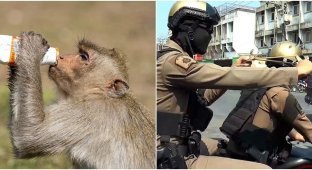Gangs of gangster monkeys terrorize a city in Thailand (9 photos + 1 video)
Swarms of rowdy long-tailed macaques are turning the Thai city of Lopburi into a veritable Planet of the Apes—in a bad way. They disrupt market traders, steal beer from trucks and attack European tourists. 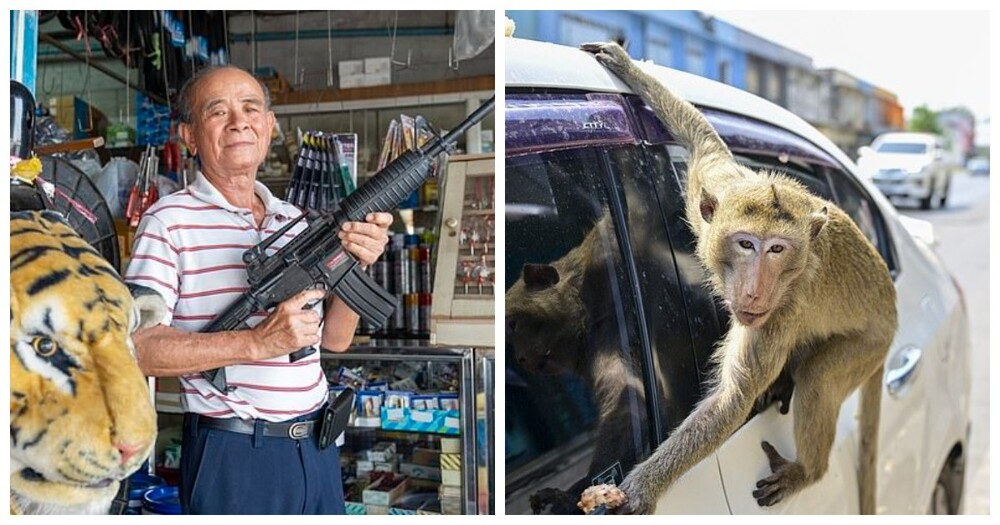
David Jones, columnist for the British edition of the Daily Mail, with an exclusive report:
A troop of macaques begins to move in and surround me within seconds of me wandering into their “lair” (an abandoned movie theater that they have taken over and vandalized). The boss, a big guy with a mustache and a fat belly, gives me a menacing look, and then sends one of his youngsters to me: a typical gangster tactic.
Noticing a bottle in my pants pocket, the macaque rests on my leg and begins to scratch it with its knife-like claws. Maybe she thinks there's something stronger than water in the bottle. The rest of the gang clearly find this all very funny and move closer to get a better view of what is happening.
But by this point I’m definitely not laughing anymore. As you can see from my sweat-soaked shirt and crooked grin, I'm already in a wave of panic. 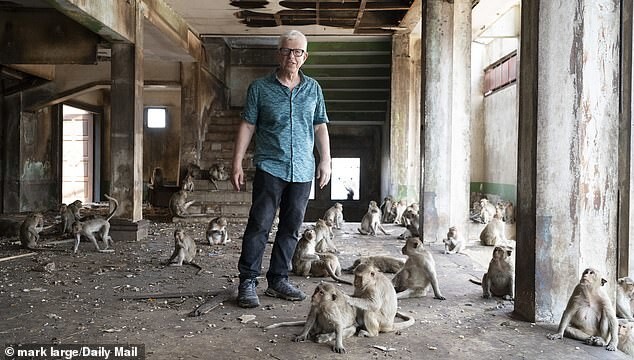
Bandit's lair
In my long career, I have come face to face with Afghan warlords, bloodthirsty Albanian criminals and razor-wielding thugs who rule the favela slums of Rio de Janeiro.
However, they all seem primitive after this week's encounter with the Monkey Mob: a huge group of long-tailed macaques who, using an unusual mixture of stealth and aggressiveness, have banded together into ghetto-like "gangs" and seized control of an entire city center in Thailand. 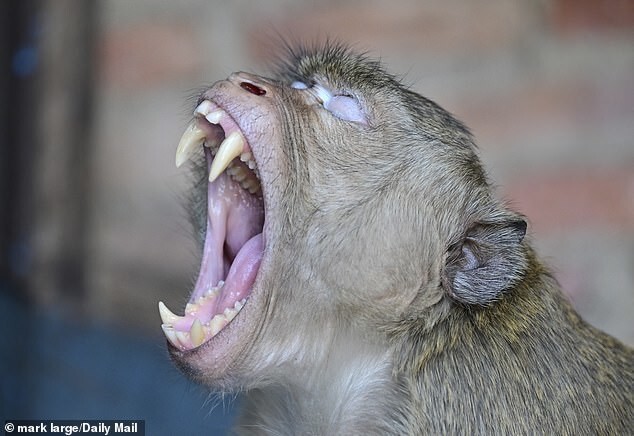
Long-tailed macaques are secretive and aggressive
For years, the monkeys gathered around a ruined Hindu temple in Lopburi, a must-stop on the European tourist route two hours north of Bangkok, were a major tourist attraction.
In their honor, in 1989, a local businessman organized an annual “monkey feast” - a lavish banquet where thousands of visitors compete for the right to please the pampered primates with the most exotic treats.
Because monkeys are believed to be descended from a legendary "monkey warrior" with supernatural powers, many Thais revere them as deities and protect them by law from the slightest human intervention.
However, over the past decade, the number of macaques in central Lopburi has increased fivefold to 4,500 individuals, and they are steadily repopulating the city's central area. 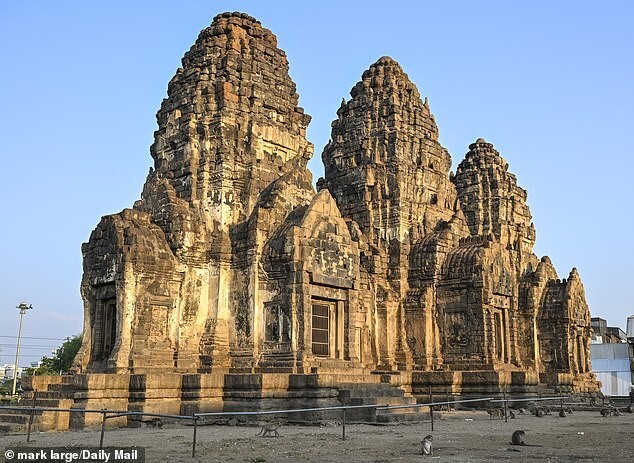
Phra Prang Sam Yot Temple, also known as the Monkey Temple, in Lopburi
As I saw this week, the apes' astonishing annexation of human territory is already complete. These little pests are absolutely everywhere. They hang from roofs, window cornices, street signs, beams, portals, waiting for the right moment to pounce on passers-by and take their food.
When they can't take food straight from their hands, they are clever enough to blackmail people - stealing sunglasses or other things from their noses and not returning them until they receive a tasty reward. 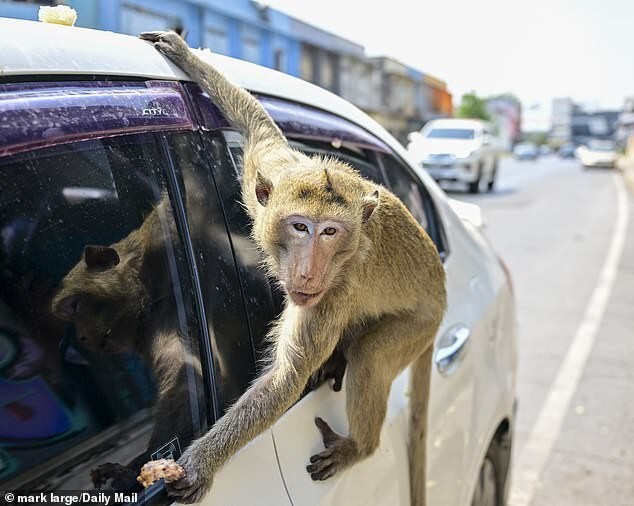
Grasping Macaque
I watched as a group of raiders ambushed an open-top beer truck that was idling at a traffic light. They took several bottles, chewed off the metal caps and drank them greedily in the 40-degree heat.
As the number of macaques grows, their wars for territory become more and more brutal, and their tactics become more and more merciless.
Last month there were two disturbing incidents. First, one of the monkeys “robbed” an unsuspecting market woman, dislocating her kneecap with a strong blow from behind, and then stole a bag of groceries. 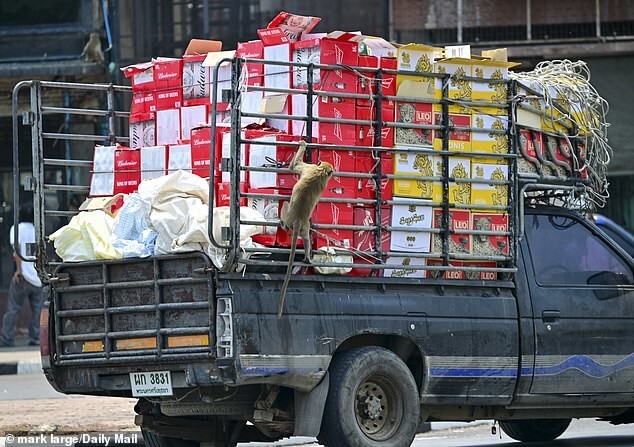
Marauder Macaque raids a beer truck
A few days later, a motorcyclist was injured when he lost control and fell when a monkey jumped on his motorcycle to steal a bag hanging from the handlebars. Fortunately, he was not seriously injured. But the authorities declared war on the gangster macaques.
Shortly after the attack, officials from the Department of National Parks and Conservation rounded up 37 macaques, believed to include four known gang leaders, and sent them to another province.
Next month they plan to begin radically reducing the population by capturing hundreds more individuals and moving them to enclosures on the outskirts of the city - although given the enormous difficulties encountered in capturing the first 37 individuals, this may be easier said than done. I'll explain why later. 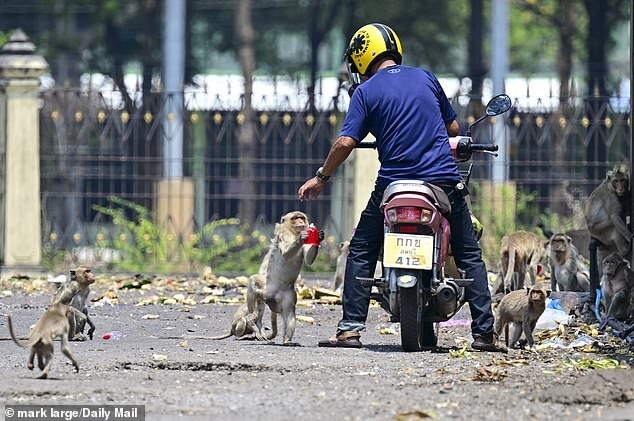
Insidious creatures threaten an unsuspecting motorcyclist
When I first flew to Thailand, the idea that the city had been taken over by a group of urbanized primates seemed bizarre and quite funny to me. When a flight attendant originally from Lopburi told me how monkeys were attacking children at his old school and stealing their school lunches, I smiled indulgently.
After a few hours I was no longer smiling. When I entered the territory occupied by macaques, I felt like I was on the set of some dystopian sci-fi film. Perhaps they were filming a fifth sequel to Planet of the Apes.
Everywhere I looked, my gaze was drawn to an eerie pair of yellowish eyes, sparkling with evil intentions. Every step I took was accompanied by a flash of fur and a flick of the tail. The sickening stench of monkey excrement hung in the hot air.
As temple manager Pramote Ketumpi told me, the monkeys were divided into four warring factions. And they behave somewhat like neighborhood youth gangs. When they invade each other's territory, either foraging for food or seeking sexual adventure, a frighteningly screeching mass brawl invariably breaks out.
Ketumpi talks about which group occupied which territory. On the city's main street is a four-story building that once housed bustling shops selling telephones, noodles and clothing. Now all of it is just a gutted shell. Merchants were driven out by constant theft of goods and attacks on frightened customers, and the place became the lair of a monkey gang that locals dubbed the Building Gang.
Another group of monkeys, known as the Temple Gang, have settled in the 1,000-year-old ruins and guard the area like ancient warriors. And then there's the Shrine Gang, whose members, as the name suggests, hang around the holy site, feasting like gods on the offerings of tourists.
Since Mr. Ketumpi's office is located on the sanctuary grounds, he can determine membership in this group by the appearance of the macaque. Its leader, Ai Lor, which translates to “Pretty Boy,” is a bulky, bushy-haired brute (an adult male can weigh 13kg and is incredibly strong) who takes the most food—and the most females.
But it was another angry macaque - much smaller and, it seems, female - that I observed there with my own eyes in the middle of the week. I saw a 9-year-old boy named Louis Patten (who had come from the UK to Lopburi with his Thai father and mother) try to give a monkey a treat he had bought from a street vendor. However, before he could open the bag, an impatient macaque jumped on his head and snatched it away. It was quite scary, I can confirm. Fortunately, the shock quickly passed, and Louis, wise beyond his years, explained his experience as “the natural order of things.”
Oh, if only I had felt so philosophical when I met the Cinema Gang, the last of the four groups to take over downtown Lopburi, in the ruins of the old film palace!
In its heyday, 20 years ago, it was the city's most popular cinema, owner Kannika Maksasithon told me as she gave me a short tour. When the advent of video and streaming movies saw fewer viewers, she converted it into a shopping center, but no one wanted to wander around an establishment where monkeys could attack you at any moment. Therefore, having lost quite a large amount, she closed it.
The metal graffiti shutters she has installed there since then have had no effect. Now the empty cinema room responds to the chilling screams and rattling steps of countless squatters in gray skins. The only film shown here in recent years was projected onto a makeshift screen by an experimental Japanese director who decided that hundreds of monkeys would be very exciting.
However, Kannika harbors no malice towards the creatures that nearly ruined her. She doesn't even want them removed from the city. Well, or let them remove them, but not all of them. “I grew up around them and still find them cute,” she says. “I just think there are too many of them and their numbers should be reduced.”
Surprisingly, despite the fact that macaques have overrun and destroyed the city center, and with it the local economy, I have heard this opinion more than once.
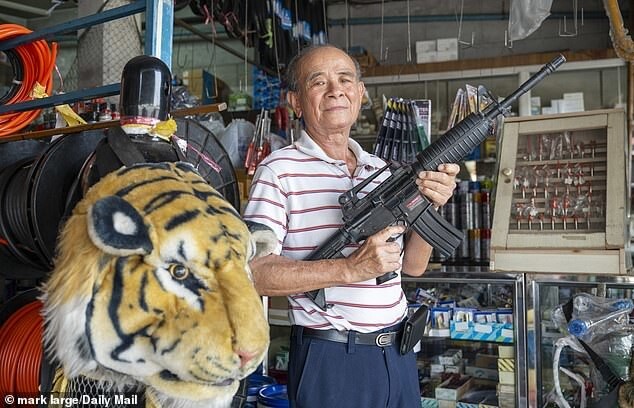
An 80-year-old building materials store owner has his own ways of scaring off monkeys.
Some traders, like 80-year-old hardware store owner Thaweesak Srisanguan, try to scare away the macaques by displaying toy predators such as crocodiles and tigers in their windows. However, the monkeys quickly realized that these predators were not real, and now he drives away the annoying macaques by shooting at them with a pneumatic gun.
Other business owners try to accommodate the raiders by treating them as equals - among them the hotel owner who allowed the macaques to take over all the rooms on the top floor (not that they gave him a choice).
Regardless of the approach, however, everyone seems to want a few hundred macaques to remain around the temple as a symbol of the city.
Ironically, I'm told, the monkey population's boom - and its resulting invasion of the city's inner city - may be due to good-natured tourists feeding them sweets. The natural food of primates consists of nuts, leaves and small animals.
According to the temple manager (who knows about this from a local veterinarian), the energy boost from junk food increases the monkeys' libido. “They can have sex up to 30 times a day,” he tells me. “But they have to do it very quickly because during mating they are most vulnerable to attack by rival gang members.” The outdoor feeding regime also appears to make females more fertile, he adds.
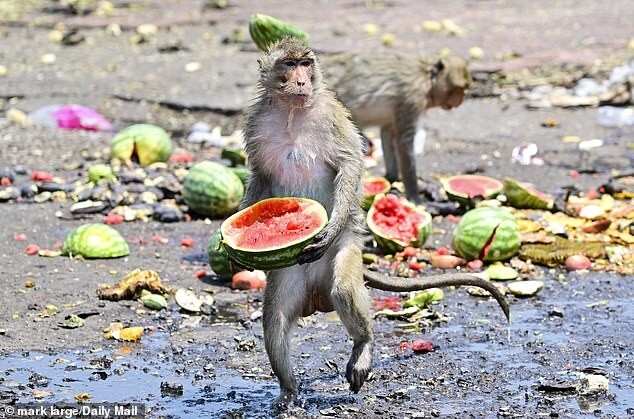
Employees of the Department of National Parks and Nature Conservation are planning to carry out a large-scale campaign to combat tailed bandits
How are the authorities going to return the center of Lopburi to the people?
While local politicians I met this week were quick to deflect blame for allowing the bizarre coup, they were quick to declare their involvement in a counter-revolution that they say will return Lopburi to people's control.
In his marble mansion, a safe distance away in the city's wealthy suburbs, MP Sittichai Lorprasongsuk told me that he and the prime minister are working on a new law that would strip monkeys of their protected status in the city and give local officials the power to move them.
In the first stage, several hundred monkeys will be caught and locked in a new “garden”. (Later, when I examined it, it reminded me more of a spacious zoo enclosure, with rubber tire swings and wire cages). This operation is scheduled to begin at the end of the month. A second such complex will be built for about 2,000 more monkeys, with only a small number remaining to live in and around the temple. But the prime minister's ultimate goal, he says, is to create a futuristic "monkey city" for tourists. “This will be our own Planet of the Apes!” - he declared.
His optimism was echoed by Lopburi Governor Amphol Ungkapakornkul. “Right now it seems like humans are living in cages and monkeys are free,” he said. “It won’t be easy to catch so many macaques, but by next year order will be fully restored.”
This confidence is not shared by those who witnessed the macaque “arrests” last month. When those tasked with capturing the primates tried to lure them into cages with bait, the monkeys very quickly understood the tactic and simply “turned on ignore.” Then the wildlife officials fired tranquilizer darts at them, but the monkeys, capable of jumping 5 meters in the blink of an eye and accelerating up to 15 m/s, used their amazing agility to evade the darts.
The few who were hit managed to climb to the highest place nearby to hide before the tranquilizer took effect. This left the macaque hunters with an unenviable choice. They could either risk life and limb trying to reach their prey over rickety roofs, or leave the drugged macaques, whose global numbers have dwindled so much that the International Union for Conservation of Nature recently listed them as endangered, to slowly die of overheating under the scorching sun. .
The people obediently chose the first option and, through great effort, eventually caught 37 macaques. However, according to a local journalist who filmed the operation, it took about 40 minutes to capture one monkey. How long will it take to catch a few thousand? This is a question for mathematicians.
All this makes city residents skeptical about the widely publicized liberation plan. "I think it's impossible to get rid of them, there are just too many of them," said Arikanta Kanchanasinmetha, 37, a mother of two whose kneecap was dislocated by that well-aimed blow last month. — Lopburi has already become a city of monkeys. Everyone who has enough money leaves. Only the poorest people remain, who have to live and work here. It’s all for show, and it’s already too late.”
After my run-in with the large and fearsome Cinema Gang, I suspect she's probably right.
In this strange and disturbing clash of man and beast - a battle that will become increasingly common as the natural world shrinks - the apes have proven their ability to make humans look ridiculous and stupid.












